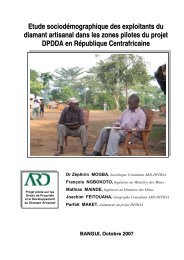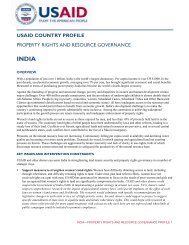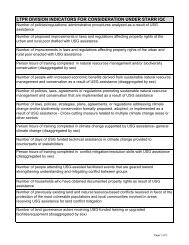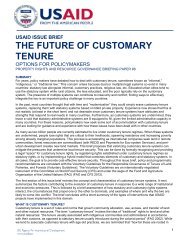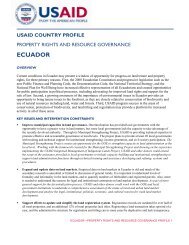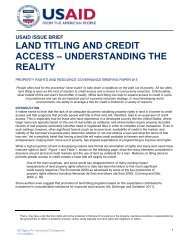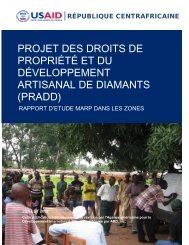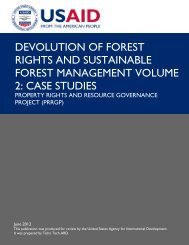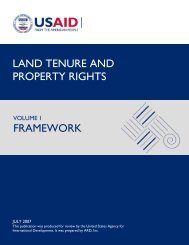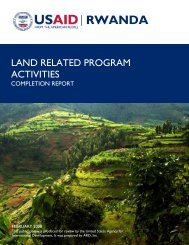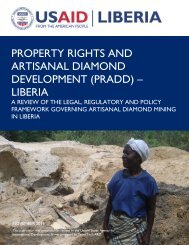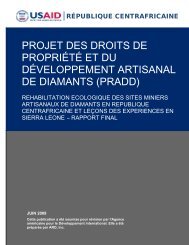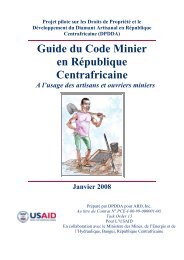ECUADOR - Land Tenure and Property Rights Portal
ECUADOR - Land Tenure and Property Rights Portal
ECUADOR - Land Tenure and Property Rights Portal
- No tags were found...
You also want an ePaper? Increase the reach of your titles
YUMPU automatically turns print PDFs into web optimized ePapers that Google loves.
targeted the high-level outcome indicator (HI): Perception that natural resources are utilized in a sustainable manner(HI-1)Change in Indicator State <strong>and</strong> Contributing Factors: The region can be divided into two general areas:the Trans Kutukú <strong>and</strong> the Upano River basin, near Macas. Change in the state of the indicator was differentin the case of each region.In the Trans Kutuku region, no major change in the use of natural resources was cited over the past sevenyears (life of the PSUR). The Trans Kutukú, representing the majority of Shuar territory <strong>and</strong> a minority of theShuar population, remains a relatively untouched <strong>and</strong> fairly pristine zone. It appears that the primarycontributing factor regarding the lack of change in the Trans Kutuku area is its geographic isolation. Whilethis has enabled a level of protection for natural resources, the situation may change with the roadconstruction that is slated to cut through this zone.Over the life of PSUR, most stakeholders described an overall deterioration in natural resources in the UpanoRiver zone as indicated by declining numbers of animals <strong>and</strong> plants—particularly trees <strong>and</strong> medicinal herbs.Respondents attributed this to the massive deforestation of the region resulting from a government policy inthe 1960s that required the majority of l<strong>and</strong> be under “active production” in order to maintain a title. Whilethis policy is no longer in effect, its result was a depleted natural resource base at the start of PSUR. TheMOE indicated that 70% of the wooded area had been cut before the year 2000. The degree of additionaldeforestation that has taken place in the Upano zone over the past five years is not clear. However, it is clearthat the Shuar frequently extract resources, such as wood, to sell for cash.Relevance of PSUR interventions to Outcome of Interest: Surprisingly, none of the surveyedrespondents credited the titling interventions carried out by PSUR for advances in sustainable NRM use.However, PSUR’s titling interventions were credited with providing protection against outsiders <strong>and</strong>preventing further damage in the Upano River region. While titling can be seen as contributing to theprevention of encroachment, its effect on sustainable natural resource management in the Upano area islimited due to the existing extensive damage to natural resources. In terms of the Trans Kutuku region,geographic isolation—which prevents access to markets <strong>and</strong> restricts demographic pressures—seems to havebeen the key factor in its unchanged natural resource state. Finally, <strong>and</strong> in both regions, PSUR’s communityforestry management <strong>and</strong> protected area management interventions were not fully implemented <strong>and</strong> thus didnot contribute to this outcome.4.4 PSUR: INTERVENTIONS4.4.1 LTPR Intervention 1: Policy <strong>and</strong> Legal Issues (Titling)Description of Intervention: <strong>L<strong>and</strong></strong> titling was the primary intervention in the PSUR policy <strong>and</strong> legal issuessub-component. 5 Communal l<strong>and</strong> titling was carried out in both the Upano <strong>and</strong> Trans Kutuku areas. Limitedindividual l<strong>and</strong> titling was carried out in the Upano River area.As part of titling activities, PSUR measured <strong>and</strong> marked borders, secured agreements with neighboringl<strong>and</strong>owners <strong>and</strong> tenants, elaborated management plans, <strong>and</strong> completed the requisite paperwork for titling ofancestral l<strong>and</strong>s. Initially, CARE subcontracted the services of an Ecuadorian NGO, Ecolex, to carry out5In the case of the Shuar, the costs related to legalization of l<strong>and</strong> have historically been financed by outside actors such as NGOs. Both thegovernment <strong>and</strong> the Shuar communities are accustomed to this external support <strong>and</strong> FICSH has not found alternative sources of funding.In the future, this may prove to be a stumbling block to the continuation of titling.INDIGENOUS TERRITORIAL RIGHTS IN <strong>ECUADOR</strong>: RAPID IMPACT ASSESSMENT 19



